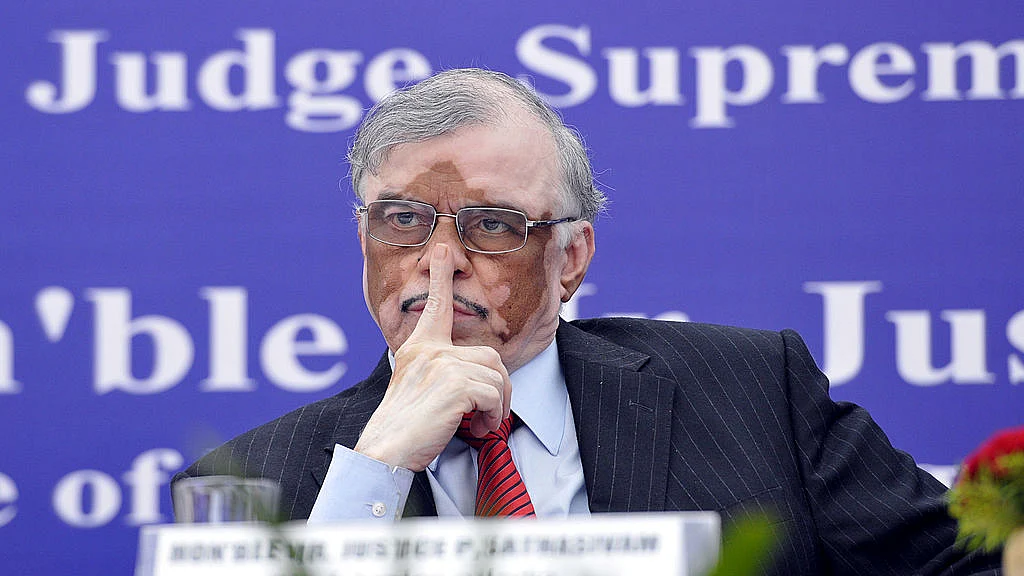A tale of two Governors and two speeches
Tripura Governor Tathagata Roy skipped parts of the address slamming the Centre and approved by the state cabinet, while the Kerala Governor P Sathasivam followed the script <br>

In the span of a week, two Governors—both appointed by the NDA government—displayed contrasting styles while reading out the respective state government’s policy statements to the state legislature.
Kerala Governor P Sathasivam, a former Chief Justice of India, unhesitatingly read out on Thursday the Pinarayi Vijayan government’s critique of the BJP-led government at the Centre’s demonetisation decision, calling it “one of the most devastating catastrophes in India’s financial history.” In stark contrast, his Tripura counterpart, Tathagata Roy, barely seven days before had skipped all those parts of the Governor’s address that slammed the Centre.
The Indian Express reported that on the opening day of Tripura’s budget session, Governor Roy told the House: “I have read out two pages and now I will read out after para 95.” Trinamool Congress legislator Sudip Roy Burman is quoted as saying that the unread paragraphs, apart from the reference to the hardship people were facing due to demonetisation, spoke also of the tense communal situation in the country, minorities and Dalits being under attack, rising intolerance, and financial constraints caused to special category states due to dismantling of the Planning Commission.
So, was Governor Roy right in refraining from reading the written policy statement of the state government? Does he have the discretion to choose what he needs to read or not? Shouldn’t the office of the Governor be neutral and not so brazenly loyal to the Centre that appoints him or her?
“Governor Roy is wrong. It is the policy statement of the government of the day and not his personal statement,” says PDT Acharya, Constitution expert and former Secretary General of the Lok Sabha.
The fact is that, whether it be the President of India or the Governors of states, the speech they read out in Parliament or in the legislatures respectively, are statements that have been approved by the respective Cabinets. “A Governor will not be blamed or asked to explain the statement he is reading out,” says Acharya.
So, was Governor Roy right in refraining from reading the written policy statement of the state government? Does he have the discretion to choose what he needs to read or not? Shouldn’t the office of the Governor be neutral and not so brazenly loyal to the Centre that appoints him or her?
The Constitution does provide certain areas of discretion where the Governor can take decisions on his own like, say, in appointing the Chief Minister especially when there is no clear majority in the House, or when sending a report to the President under Article 356 of the Constitution. “But not on governance issues. Here, he has to function on the advice of the Cabinet,” says Acharya.
The problem, however, is a larger one and resides in the appointment of the Governor. Article 155 of the Constitution says that the Governor of a state shall be appointed by the President by warrant under his hand and seal. A Governor, ideally, is supposed to be an apolitical, neutral person who represents the President in a state and is the protector of the Constitution. Also, ideally, the persons appointed as Governors should be people with high stature and ethics.
However, the reality is that the chief criterion for appointment is usually the loyalty to the party/ coalition ruling at the Centre. And, is usually doled out as a reward, say, for life-long service to an ageing party loyalist or a senior leader who lost the elections or, worse, to “keep under check” an Opposition-ruled state that the Centre doesn’t get along with well.
“Governor Roy is wrong. It is the policy statement of the government of the day and not his personal statement.”PDT Acharya
Though Article 156 says the Governor shall hold office “during the pleasure” of the President, what it really means is that the Centre can appoint or remove the Governor any time it wants. And, usually every time a new government takes office at the Centre, the Governors appointed by the predecessor also make way.
Both Sathasivam and Roy have been appointees of the Narendra Modi government. Sathasivam’s appointment was initially slammed by the Opposition for two reasons—many saw it as a post lower in precedence to that of the Chief Justice of India and some had cast aspersions on a case during the end of his CJI tenure where BJP National President Amit Shah got some relief.
“The oath of the Governor emphasises two important roles for the Governor—preserve, protect and defend the Constitution and the law and serve the people with their well-being being the top priority. Nothing else,” says Acharya. And, that is what every Governor ought to strictly follow.
Follow us on: Facebook, Twitter, Google News, Instagram
Join our official telegram channel (@nationalherald) and stay updated with the latest headlines
- Lok Sabha
- BJP
- intolerance
- Constitution
- demonetisation
- Amit Shah
- Kerala
- Pinarayi Vijayan
- Parliament
- Chief Justice of India
- Opposition
- Tripura
- Trinamool Congress
- NDA Government
- Chief Minister
- Dalits
- minorities
- Planning Commission
- communal
- Tripura Governor
- Tathagata Roy
- state cabinet
- Kerala Governor
- P Sathasivam
- Sudip Roy Burman
- special category states
- PDT Acharya
- Secretary General
- President of India
- state legislature
- Article 356
- Article 155